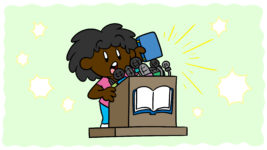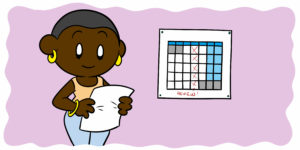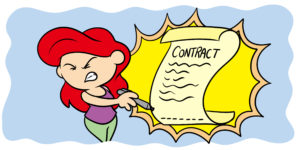Let’s get this out of the way quickly: nobody likes criticism. To pour your heart and soul into creating a story only to have an anonymous stranger badmouth your efforts is utterly heart-breaking.
It’s no wonder so many authors handle criticism so badly, and publicly. But vocal reactions to criticism can have damaging effects on an author’s credibility. Take for example the writer Candace Sams who threatened to report her critics to the FBI. I think we can all agree that this isn’t the best way to react to negative reviews.
But while authors who respond irrationally to criticism inevitably lose face, those who show humility and gratitude for negative words can enjoy a more positive online reputation as a result. The way you respond to critics is very important to your readers’ opinions of you, and while a negative comment may sting, it’s often possible to turn it to your advantage.
Beware the trolls
When considering whether or not to respond to criticism, it is vitally important to spot the difference between ‘trolls’ – people who are unnecessarily critical because it gives them some form of twisted pleasure – and people who are (they believe at least) trying to help you.
A smart writer will never engage an internet troll – they will trust their readers to do the dirty work for them. If somebody badmouths your writing in a public space, there’s a good chance your fans will set them straight without you having to do anything.
Alternatively, if somebody is trying their best to offer constructive criticism, there’s nothing that can be better for your reputation than being gracious. Thank your reader for their input and not only will they feel valued, but other readers will know that they can reach out to you without fear of offense.
The more you can encourage this relationship of sharing to develop, the more loyal your readers will become, and the further your work will travel as they share it with their friends.
Turning criticism into an opportunity
Sadly, it’s very rare to see a truly excellent example of a creator responding to criticism online, but examples do exist. Recently, screenwriter Jack Stentz, who has co-written blockbuster movies including Thor and X-Men: First Class, saw a Youtube ‘Honest Trailer’ video which heavily criticized his writing. In a fit of frustration, he got on Twitter to vent his anger at critics:
Fair warning: if you link to one of those insufferable “Honest Trailers” videos, I will unfollow you.
— Zack Stentz (@MuseZack) July 3, 2014
Calling your critics ‘insufferable’ is probably not the best way to deal with an unpopular opinion. But the Screen Junkies movie critics, who create Honest Trailers, now found themselves at the receiving end of some negative criticism. Instead of getting upset or annoyed, the team did something very smart: they invited Jack Stentz to visit their studios so that he could respond to their criticism in person. The result was a Screen Junkies Youtube video where the team interview Stentz before watching their Honest Trailer for Thor alongside him, giving him a chance to explain his writing choices.
The video is an absolutely fantastic piece of marketing for both Screen Junkies and Jack Stentz. Both groups are shown to be humble, willing to take criticism, and very friendly. Stentz is given time to explain the quirks of his writing that he wouldn’t ordinarily get, while the Screen Junkies team show viewers that they don’t take themselves too seriously. While this is a very large, public example of a good response to criticism, the smaller moments are just as vital.
When you reply to social media comments or book reviews, it’s a lot more intimate – your readers will probably be aware that you’re responding from your phone while sat on the toilet. It’s a chance to show your fans who you are at your most vulnerable, and, if you’re able to show that you value your readers’ opinions, they’ll love you all the more for it.
Remember the big picture
When responding to fans, it’s important to help them feel appreciated and valued, it’s also crucial to remember that you can’t please everyone. You need to show your readers that you respect their opinions without always bowing to their demands. JK Rowling, author of the Harry Potter books, drew a lot of criticism from fans for mentioning after the book series had been completed that one of the main characters, Professor Dumbledore, was gay – this had been hinted at in the final book, but not stated explicitly.
Recently, a fan sent Rowling a tweet expressing her disbelief at Dumbledore’s sexuality: “Thank you so much for writing Harry Potter. I wonder why you said that Dumbledore is a gay because I can’t see him that way.” Rowling’s response was not harsh or insulting to the fan, but she defended her decision:
.@anakocovic21 Maybe because gay people just look like… people?
— J.K. Rowling (@jk_rowling) March 24, 2015
Fan response to Rowling’s tweet was overwhelmingly positive, with many applauding Rowling’s quick dismissal of the idea that gay people somehow look different to straight people.
Rowling was also quick to follow up her initial tweet with a defense for the fan who had asked the initial question, making sure that all of her followers knew not to take offense where none was intended:
A minority of people are rushing to judgement without the facts, so here they are: @anakocovic21 did NOT ask an offensive question!
— J.K. Rowling (@jk_rowling) March 25, 2015
JK Rowling’s comments provide a fantastic example of how to gain positive exposure while dealing with fan negativity – she was very careful not to personally attack her critic, she calmly explained her writing decision, and she remembered what her wider audience needed to hear.
It would have been easy for Rowling to ignore the tweet, as she does with many others. But she could tell that her fan didn’t mean offense, and she recognized this as an opportunity to speak out to her followers about a subject that means a lot to many of them.
Positive interactions with fans, even when their comments are critical, is an excellent way to build your profile as an author, develop your relationship with your fans, and address concerns that critics may have about your writing. While your knee-jerk reaction to criticism may be to lash out, a more measured approach can see you winning more love from your readership.
But there’s no perfect formula to addressing fan concerns. Do you have any examples of how to respond to critics? Have you ever been on the receiving end of negative reviews that turned out to be a blessing in disguise? Please share them with us in the comments below.






2 thoughts on “How To Get Good Publicity Out Of Bad Book Reviews”
Thanks for a great article and an absolutely hilarious movie trailer – I love the Marvel super heroes. I also write historical romance under a pseudonym and one of my best books, recently rereleased on Amazon, got a one star. Shattered, I read further, to discover the reviewer had said there should be a section for no stars. No stars? Horrified (since this book had gained really nice comments on romance sites and Wattpad) I tracked the reviewer to her lair … to find that every single book she’d ever read was trashed in the most unflattering terms (so I got off lightly) with remarks about puerile plots, cardboard characters and other slings and arrows that no author wants to receive. In fact, the only thing that got a five star review was a set of table decorations for her daughter’s wedding she had purchased on Amazon. I shared my lowly review status on Facebook and got an overwhelming amount of support from friends and fellow authors, including some of their hilarious anecdotes. So, best laugh off a poor review. It’s only an opinion after all.